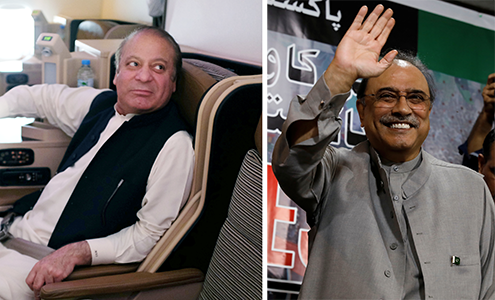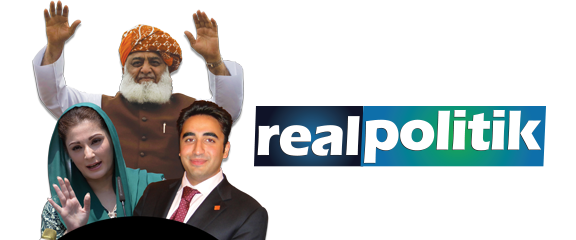COVID-19 ravaged Pakistan last year, battering an already tanking economy and threatening a carefully managed civil-military coalition led by Prime Minister Imran Khan, trying to find its way in a maze of complex challenges.
Nonetheless, a motley group of politicians and wannabes, past and present, made an attempt to dislodge Khan by creating an 11-party alliance. And from its inception, that was just a hot air balloon leaking air. Given that picture, Pakistan’s political scene can only be described as theatre of the absurd.
It includes a coalition government, cobbled together and kept intact by an anxiously watchful establishment that was looking to oversee and micro-manage a stable set-up, one with integrity. It found one not quite matching that description, but for want of options, had to accept it and took it for a trial run.
The new government, inexperienced and with a team made up largely of novices or former members of other political parties now in the opposition, was pleasantly surprised when it was ushered into power. It needed support, and had to do the daunting job that was required — particularly given the loose strings and slippery constituents it had to contend with — with on-the-job learning.
The PTI government began its reign with accountability as its bedrock. Since the binding glue was invisible, the government seemed to struggle every murky inch of the way, but it’s power-handlers had its back, every faltering step it took.
Burdened by a dubious team whose portfolios were regularly recycled, PM Khan slowly found his feet, grew into his shoes and made his mark, locally and globally. He put his anti-corruption agenda on fast forward, in the process drawing all major opponents and past rulers including Asif Zardari, the Brothers Sharif, Maulana Fazlur Rehman into the accountability net.

As a result, the opposition found itself cornered and insecure. With little recourse, its fightback fell to proclaiming that democracy was under attack. Khan’s term of office had started by the opposition calling the new set-up fake and illegal, and “selected,” but that went nowhere, and halfway into the government’s tenure, this slogan-mongering, even if louder, came a little too late to really register with the people. While there were pressing issues on the economic front, exacerbated by Covid, democracy was clearly not under threat. And because it had no leg to stand on, this claim did not resonate with either the masses or the khakis.
Faced with a dead-end, the Opposition then started asking for extra-constitutional intervention by the military. That was a landscape Pakistan has seen many a time in the past, and there was a consensus that it did more harm than good. So an opposition making endless noise, aptly described in 2001 by Ronald Gearles as “The cacophony of phlegmatic and tubercular lungs punctuated here and there by a moan or a scream of someone terrified, thrashing in the throes of a nightmare.”
Meanwhile, all was not well in the PTI camp either. Imran Khan wanted the accountability process to move quickly, but between the slow moving bureaucracy, lackadaisical judiciary and a lingering uncertainty among the power-handlers about giving too free a hand to Imran Khan lest he himself became some sort of problem, the accountability process was stymied. A case in point was Nawaz Sharif’s great escape. Helped tacitly by embedded sympathisers in the judiciary, media and the bureaucracy, and probably in some ranks of the khakis, Sharif managed to get out of jail and then fly out of the country, leaving all, including PM Khan astounded and somewhat cheated. However, Sharif’s daughter was forced to stay in the country, as were his brother and nephew, now both in jail.
The biggest loser in the game has been Maulana Fazlur Rahman as he headed an incongruous alliance as a titular head with no power.
Zardari, who was also caught in a web of financial frauds and well-networked scams, also started using his skills to beat the system. And his main trump card — the Sindh Government — kept him afloat. He then went on to cleverly join all the other worried opposition leaders and the alliance of the unlikely bedfellows, the Pakistan Democratic Movement (PDM), was created. Zardari banked on the PDM bolstering his blackmailing power, and analysts speculated that as in the past, when needed, he would ditch the alliance. Meanwhile, with the security provided by the alliance under his belt, and buffered by the seeming invincibility of the Sindh Government, Zardari remained ensconced in his safe Bilawal House haven, and launched his son to learn the tricks of the game: how to bully, brag, boast and blackmail — an on-the-job internship without any real decision-making powers.
Son Bilawal did well and along the way struck a warm note with Nawaz Sharif’s daughter Maryam, who visibly also enjoyed the proximity with her new comrade. Maulana Fazalur Rahman was made the titular chief of this alliance, with each member of this grouping finding strength and taking cover under the blanket of the unity it ostensibly provided, but in reality, everyone was looking after his or her own personal and political interest.
Alliance in place, a pantomime of a mass movement was launched and there followed months of sound and fury signifying nothing and flaunting urgently-needed Covid-induced SOPs on the streets and in drawing rooms all over the country.
Formed on the basis of a one-point agenda of removing Imran Khan, even before it really went on the offensive, the PDM started load shedding, as internal differences emerged within the member parties of the alliance itself. Meanwhile, dates, deadlines, and ultimatums for showdowns made no significant dent on the Imran Khan government, or its backers in the shadows. And so, desperation grew among PDM ranks, with Nawaz Sharif taking on the Gods on Mount Olympus — the hitherto ‘untouchable’ khakis, from the safety of the British Isles. Other smaller players like Balochi nationalists and religious non-entities also stayed in the fray, making objectionable noises — just in case…
Finally Khan responded: he announced early Senate elections. And that threw the final spanner in the PDM’s plans.
Nawaz Sharif wants to become a Pakistani Nelson Mandela without going through the rigorous sacrifices that are needed.
Zardari knew the alliance’s bluster was not working and Khan would emerge as a stronger leader if they resigned from parliament, boycotted the polls or stayed away from the process — as the PDM had long been threatening to do, with assorted party leaders waving resignations from the parliamentarians of their respective parties for use when they deemed necessary. And with the PPP deciding to contest the Senate elections, and other parties uncertain about resigning their parliamentary seats, the PDM’s strategy to overthrow the PTI government seemed to have whittled down to a non-starter.
This was the short history of the failed Opposition.
The biggest loser in this game has been Maulana Fazlur Rahman as he headed an incongruous alliance as a titular head with no power. In the process he invited the wrath of the power-handlers as his own corruption cases came to light and his party wing in Balochistan bolted. His base of religious students also became a target of the establishment’s ire. The Maulana has been badly hurt and will be dressing his wounds for some time.
Meanwhile, Zardari may have sabotaged the declared goals of the PDM, as was expected by political analysts, but he is himself not out of the woods. The biggest threat to his Sindh safe haven will be posed if Khan wins a majority in the Upper House and legislates new laws and possible constitutional changes, including the 18th Amendment, which has given excessive powers to the provinces.
The PPP would then be compelled to make face-saving compromises and offer concessions to the Centre to secure its government in Sindh. If Zardari manages to handle his corruption cases according to the existing rules of the NAB — i.e. pay back the money, or at least part of it, and maybe even scapegoat his cronies in the process — he may manage to get a National Reconciliation Ordinance (NRO) for himself.
Imran Khan has to better his governance skills, do load shedding of some of the people around him who have not produced anything, and muster better human resources.
The biggest challenge remains for Nawaz Sharif and his party. So far in his entire career, he has not demonstrated the courage and strength necessary to face adversity that real leaders demonstrate. He wants to become a Pakistani Nelson Mandela without going through the rigorous sacrifices that are needed.
His party is already in several minds. So far no major leader has broken ranks, but many second rankers are deeply worried, fearing that the Sharif family could leave them again in the middle of the storm and bolt.
Maryam Nawaz only became the leader of the PML-N because she was denied the concession by Imran Khan to join her father in exile. Had she been allowed to go, the party would now be leaderless, especially since Shahbaz Sharif is also in dire straits. PM Imran Khan says the cases against him are solid, and if so, it will be almost impossible for him to dodge the bullet.
Once he crosses the Senate Rubicon, as now expected, Khan will be on a much stronger wicket. Maybe then, in the larger national interest, he might even be willing to talk to some of his PDM opponents.
The main challenge to Khan so far has come, and will increase to confront him, from within. He has to better his governance skills, do load shedding of some of the people around him who have not produced anything, and muster better human resources.
He has to push the judiciary to move on accountability. He is already saying that special courts should be created to close this never-ending chapter, and he should see this is done.
The courts, NAB and all other institutions have to call it curtains for the theatre of the corrupt. Those who need to be punished must be punished, and those who can be acquitted need to be allowed to get back to normal work.
Ruthless and shameless politicians have held Pakistan hostage for years and this baggage must be tossed overboard. More chaos and confusion will hurt everyone, benefit none.




Letting Nawaz Sharif off was a blunder by otherwise rock solid PM IK.
Not appealing against Maryam Safdar’s bail is another “mystery” – total inaction by the state.
Allowing PDM rally in front of ECP is another mistake, disturbing peace of Islamabad when schools/colleges had opened a day before.
We would appreciate if you could share these thoughts about the article, at letters@narratives.com.pk along with your picture, city, and complete name.
Shaheen je,
You are dong the BEST work………. Congratulation.
When you are in Amsterdam Let me Know and have Coffee with me.
if you like send me the whatsapp of Irfan Form UK he is also Done very Nice work of Nawaz Case.
Looking forword to your reply.
Love and peace
Raas jee
Amsterdam
whatsapp.0031645674516